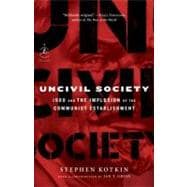
Uncivil Society
by Kotkin, Stephen; Gross, JanBuy New
Buy Used
Rent Book
Rent Digital
How Marketplace Works:
- This item is offered by an independent seller and not shipped from our warehouse
- Item details like edition and cover design may differ from our description; see seller's comments before ordering.
- Sellers much confirm and ship within two business days; otherwise, the order will be cancelled and refunded.
- Marketplace purchases cannot be returned to eCampus.com. Contact the seller directly for inquiries; if no response within two days, contact customer service.
- Additional shipping costs apply to Marketplace purchases. Review shipping costs at checkout.
Summary
Author Biography
Jan T. Gross a native of Poland, also teaches at Princeton, where he is the Norman B. Tomlinson ’16 and ’48 Professor of War and Society. He was a 2001 National Book Award nominee for his widely acclaimed Neighbors: The Destruction of the Jewish Community in Jedwabne, Poland. His most recent book, Fear:Anti-Semitism in Poland after Auschwitz, was named one of the best books of the year by The Washington Post.
From the Hardcover edition.
Excerpts
Bank Run
“How did you go bankrupt?
” “Two ways. Gradually and then suddenly.” —Ernest Hemingway, The Sun Also Rises
The wry Romanian filmA fost sau n- a fost?(2006), known in En - glish as12:08 East of Bucharest,poses a seemingly passe question: Was there or was there not—“A fost sau n- a fost?”—a revolution in 1989? Most of the film takes place at a desk, as an on- air discussion inside a television studio. (It is often said that Romania’s 1989 events took place mostly on TV.) The pompous host (who is given to quoting Herodotus) is called Virgil Jderescu, a provincial TV station owner whose talk show is calledIssue of the Day.This particular day is December 22, 2005, and the issue is what happened on the same date sixteen years earlier. After some potential panelists bow out, Jderescu goes live with a debt- ridden, alcoholic history teacher named Tiberiu M∫nescu and a grumpy, lonely pensioner named Emanoil Piscoci who dresses up as Santa Claus for children. The telecast backdrop shows the live image of a drab, unnamed Stalinist- style wide town square (thought to be Vaslui, the eastern Romanian hometown of the film’s director, Corneliu Porumboiu). The film’s nonaction is riveting: three men sitting in chairs. Jderescu keeps asking “Was there, or was there not, a revolution in our town?” M∫nescu recounts how on December 22, 1989, he had gone to their town square with three other teachers—conveniently, two are now dead and one departed for Canada—before 12:08 p.m., as part of a protesting vanguard. The timing is crucial because Nicolae Ceauoescu, the Romanian dictator, fled Bucharest by helicopter precisely at that time. The Santa Claus impersonator claims that he, too, went to the square, albeit after 12:08. Jderescu takes a call to the show: it’s the sentry on duty in the town square sixteen years ago, who denounces as a lie M∫nescu’s claim to have been on the square before 12:08. Another caller places M∫nescu at the corner bar drinking the whole day and night. As callers along with the host impugn M∫nescu’s story, the latter interjects, “Why split hairs over such stupidity?” The broadcast winds down by depicting—live on the studio backdrop—forlorn gray buildings, a darkening sky, streetlights turning on, and beautiful snow falling. The last phone- in caller says, “I’m just calling to let you know it’s snowing outside. It’s snowing big white flakes. Enjoy it now, tomorrow it will be mud . . . Merry Christmas, everybody!” The woman reveals that she lost her son on December 23, 1989, the day after the revolution.
The film seems to examine whether a revolution can take place if no one risks anything, at least in this town, and it seems to reinforce a general impression that Romania in 1989 was the grand exception. Romania, it is often said, was the only Eastern European country whose experience in 1989 was supposedly a coup, not a revolution. Or it is said that Romania did have a revolution, but it was stolen.1 Adding to this sense of exceptionalism, Romania turned out to be the only country besides Yugoslavia where socialism’s end was bloody. That carnage notwithstanding—officially Romania suffered 1,104 dead, mostly after December 22—it will be our argument that Romania in 1989 was not an exception but part of a continuum that includes East Germany as well as most other cases. Communist Romania had a minuscule opposition. It was a country of Tiberiu M∫nescus and Emanoil Piscocis, as well as Vir
Excerpted from Uncivil Society: 1989 and the Implosion of the Communist Establishment by Stephen Kotkin
All rights reserved by the original copyright owners. Excerpts are provided for display purposes only and may not be reproduced, reprinted or distributed without the written permission of the publisher.
An electronic version of this book is available through VitalSource.
This book is viewable on PC, Mac, iPhone, iPad, iPod Touch, and most smartphones.
By purchasing, you will be able to view this book online, as well as download it, for the chosen number of days.
Digital License
You are licensing a digital product for a set duration. Durations are set forth in the product description, with "Lifetime" typically meaning five (5) years of online access and permanent download to a supported device. All licenses are non-transferable.
More details can be found here.
A downloadable version of this book is available through the eCampus Reader or compatible Adobe readers.
Applications are available on iOS, Android, PC, Mac, and Windows Mobile platforms.
Please view the compatibility matrix prior to purchase.
